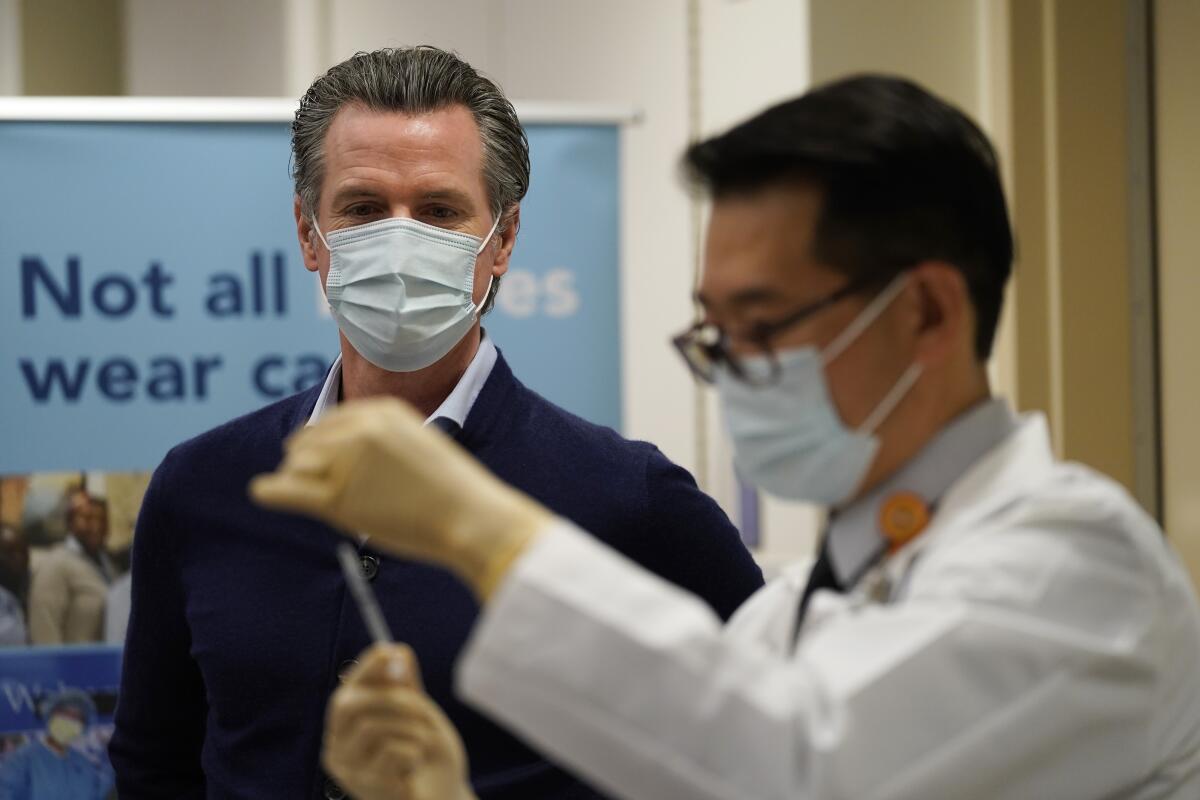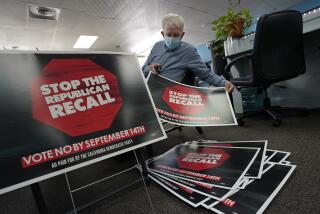Editorial: In recall elections, all Californians can lose

Gov. Gavin Newsom took office Jan. 7, 2019, and the first campaign to recall him was launched two months later by a Republican candidate looking for publicity in her long-shot run for Congress.
That effort failed, as did her 2020 bid for the 36th Congressional District — along with the attempts to recall six other Democrats holding statewide constitutional office. But it did not deter other Newsom opponents from trying the same tactic less than a year later. That effort might have faded into obscurity too, like most of the other unsuccessful gubernatorial recall attempts in California’s history, were it not for the COVID-19 pandemic that struck the following month, extending the signature-gathering period for the recall and generating a bevy of scared, angry and frustrated people looking for a scapegoat.
Now the Recall Gavin 2020 campaign is picking up speed, and we should all be worried about where it is headed.
Recall proponents say the campaign has gathered more than half of the nearly 1.5 million signatures needed to force a special election in 2021, and they’re confident they will have the rest before the March deadline. And that’s without trying very hard; organizers say voters are so motivated that they can’t sign petitions fast enough.
There’s no argument that Newsom and his administration have made missteps in their handling of the COVID-19 crisis. We are still stunned that the state Employment Development Department could manage to be swindled into paying as much as $8 billion in fraudulent claims for unemployment benefits, and still appalled that Newsom exercised such poor judgment in attending a dinner at the French Laundry with 11 other people for the birthday of a lobbyist. To quote the defense lawyer in “The Undoing”: How stupid can you get?
But are those reasons to remove him from office in a special election that could cost as much as $81 million when a regularly scheduled gubernatorial election will occur a year later? Missteps are bad, but they don’t justify the cost and potential damage to the state of having a recall election amid a pandemic. Scorched-earth tactics like that tend to leave everyone a loser.
The proponents say the campaign is nonpartisan, but we can’t help but notice that Republicans far and wide seem to have hitched a ride on the recall train once it gained some momentum, as it did in 2003 after an activist started a recall drive that concluded with Democratic Gov. Gray Davis getting booted in favor of Republican movie star Arnold Schwarzenegger.
Perhaps Republicans are hoping for a replay of 2003, but they should be careful what they wish for. There’s no guarantee that a recall election would result in the ouster of Newsom, who is still popular with a majority of Californians despite the restrictions he’s imposed during the pandemic, according to a new poll. And even if it did, it’s not preordained that his replacement would be a Republican. Even if the GOP can recruit another movie star to enter the race, the party has been losing influence in the state for years and now accounts for less than one-quarter of the state’s 22 million voters.
Indeed, California could end up with another Democrat as governor and perhaps one much more progressive and less business-friendly than Newsom. Republican businessman John Cox, who lost in a landslide to Newsom in 2018, clearly thinks he has a shot in a recall and is one the major funders of the effort, but Cox should take a lesson from Rep.-elect Darrell Issa (R-Vista), who during his previous stint in Congress spent $1.7 million to support the 2003 recall only to see his hopes of becoming the next governor terminated.
California’s direct democracy system puts tremendous power in the hands of the people to make new laws or repeal existing ones they don’t like, as well as to remove elected officials not serving their interests. But this power has increasingly been misused by those with scores to settle or with business interests to promote. When that happens, it makes us all losers.
More to Read
A cure for the common opinion
Get thought-provoking perspectives with our weekly newsletter.
You may occasionally receive promotional content from the Los Angeles Times.










